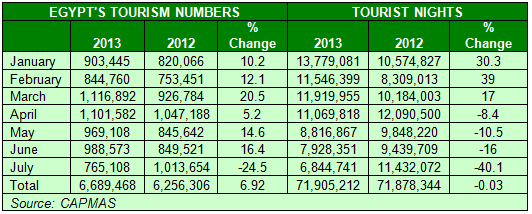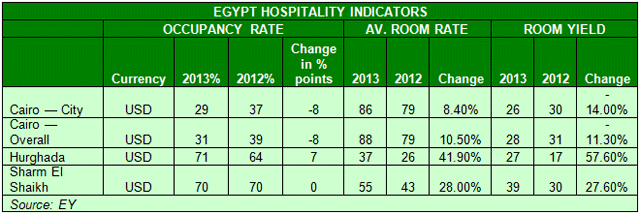Should be interesting to see if this pans out or not! Sorry for the blogging silence, I will have plenty to update shortly :) According to recent Tweets from Hurghada, the governor is hopeful and anticipating 100% occupancy rates in hotels in the Red Sea in the coming future. With TUI and other travel agencies resuming flights to Egypt, it may be a far stretch to hope for 100% but it is a positive sign that things may hopefully be on the uptick again in the devastated tourist regions such as Hurghada.
The article below, from Zawya.com, provides startling insight into just how much the tourism industry in Egypt has suffered.
Egypt's hotel occupancy rates continue to fall as the country's hospitality sector reels from the continued political turmoil.Cairo hotel room occupancy rates declined to 31% in the first half of this year from 39% in the first six months of 2012, while occupancy in Sharm Al-Sheikh was flat at 70% during the same period, according to a new survey.
Average room rates across the country's hospitality industry saw double-digit growth as the sector showed signs of life in the first six months of the year, according to management consultancy EY.
"Through the first half of 2013, both the Hurghada and Sharm El Shaikh hospitality markets witnessed a substantial increase in RevPAR compared H1 2012. Both resort hotspots achieved RevPAR growth of 57.6% and 27.6% respectively over the same period in 2012," EY said.
But that growth appears to have been short-lived as tourism figures have plunged in the past month and places like Luxor saw occupancy rates shrink to 5%.
As empty hotel rooms litter the coastlines and main Egyptian cities, the industry is yearning for the glory days when visitors from all over the world came to marvel at Egypt's archaeological riches.

Egyptians had taken special pride in showcasing their heritage and had built a sector that contributed a little over 12% of the economy and was a major job creator, with one in every eight Egyptian involved in the sector.
But the industry has faced one setback after another since the departure of Hosni Mubarak's government.

After massive upheavals, Mohammad Morsi's government came to power but its hardline religious mandate was always going to create friction with the free-wheeling and liberal hospitality sector.
While Morsi pledged not to impose the Muslim Brotherhood doctrine on the hospitality sector, his decision to nominate a member of the Islamist group Gamaa Islamiya -- which has been accused of killing scores of people in Luxor in 1997 - as the governor of Luxor, shocked the industry.
Luckily, that decision never came to pass as the Muslim Brotherhood government was ousted by the army in a largely popular coup two weeks later.
TRAVEL WARNINGS
The article below, from Zawya.com, provides startling insight into just how much the tourism industry in Egypt has suffered.
Egypt's hotel occupancy rates continue to fall as the country's hospitality sector reels from the continued political turmoil.Cairo hotel room occupancy rates declined to 31% in the first half of this year from 39% in the first six months of 2012, while occupancy in Sharm Al-Sheikh was flat at 70% during the same period, according to a new survey.
Average room rates across the country's hospitality industry saw double-digit growth as the sector showed signs of life in the first six months of the year, according to management consultancy EY.
"Through the first half of 2013, both the Hurghada and Sharm El Shaikh hospitality markets witnessed a substantial increase in RevPAR compared H1 2012. Both resort hotspots achieved RevPAR growth of 57.6% and 27.6% respectively over the same period in 2012," EY said.
But that growth appears to have been short-lived as tourism figures have plunged in the past month and places like Luxor saw occupancy rates shrink to 5%.
As empty hotel rooms litter the coastlines and main Egyptian cities, the industry is yearning for the glory days when visitors from all over the world came to marvel at Egypt's archaeological riches.

Egyptians had taken special pride in showcasing their heritage and had built a sector that contributed a little over 12% of the economy and was a major job creator, with one in every eight Egyptian involved in the sector.
But the industry has faced one setback after another since the departure of Hosni Mubarak's government.

After massive upheavals, Mohammad Morsi's government came to power but its hardline religious mandate was always going to create friction with the free-wheeling and liberal hospitality sector.
While Morsi pledged not to impose the Muslim Brotherhood doctrine on the hospitality sector, his decision to nominate a member of the Islamist group Gamaa Islamiya -- which has been accused of killing scores of people in Luxor in 1997 - as the governor of Luxor, shocked the industry.
Luckily, that decision never came to pass as the Muslim Brotherhood government was ousted by the army in a largely popular coup two weeks later.
TRAVEL WARNINGS
As Egypt's political players have taken turns at running the country, the uncertainty has hit the tourism industry hard.
Over the past two years, European governments have issued travel warnings, further exacerbating the situation.
In August, tourism minister Hisham Zaazou issued a YouTube video, urging governments to reconsider the negative advisories.
"The areas particularly in the Red Sea and Southern Sinai are quite safe and sound," the minister said in a video message aimed at travel agencies.
"One of the reasons I am saying that is in spite of the fact that there is a curfew in Egypt in many places, it does not include the Red Sea area, the Sharm El Sheikh and Southern Sinai area. That is a reflection that the government is comfortable [with receiving] any guest [and can guarantee that] they will] enjoy their time in Egypt, [which is] sound and safe. We accordingly, ask these different governments particularly in Europe... to lift even on a gradual basis the negative travel advisories."
Europeans constitute the majority of international visitors to Egypt, but a number of international travel agencies have shunned the country's historical treasures and sun-drenched resorts for the far safer shores of places like Morocco and the UAE.
Over the past two years, European governments have issued travel warnings, further exacerbating the situation.
In August, tourism minister Hisham Zaazou issued a YouTube video, urging governments to reconsider the negative advisories.
"The areas particularly in the Red Sea and Southern Sinai are quite safe and sound," the minister said in a video message aimed at travel agencies.
"One of the reasons I am saying that is in spite of the fact that there is a curfew in Egypt in many places, it does not include the Red Sea area, the Sharm El Sheikh and Southern Sinai area. That is a reflection that the government is comfortable [with receiving] any guest [and can guarantee that] they will] enjoy their time in Egypt, [which is] sound and safe. We accordingly, ask these different governments particularly in Europe... to lift even on a gradual basis the negative travel advisories."
Europeans constitute the majority of international visitors to Egypt, but a number of international travel agencies have shunned the country's historical treasures and sun-drenched resorts for the far safer shores of places like Morocco and the UAE.
TOURIST TRAFFIC SLIDES
As such, Egypt's international tourist arrivals have fallen from just over 14 million in 2010 to 11.2 million in 2012 - a decline of 32.4% in the past two years. It was even worse in 2011 when less than 10 million entered the country, as tourists balked at the sight of a political crisis unfolding in the country.
Tourism receipts have also fallen from USD 12.5 billion in 2010 to USD 9.9 billion in 2012, according to the United Nations World Tourism Organization.
Not surprisingly, no new hotels were opened in the market in the second quarter of the year, but the Egyptian Hotel Association notes that at least 29 hotels with nearly 8,000 hotel rooms are under development in Cairo alone.
Some of these projects are likely to be delayed or pushed back, as tourists stay away.
Egyptian newspaper El-Masry Al-Youm reported that around 86 of the 248 Red Sea Governorate hotels have closed since the political troubles began. Shaker Abdel Azim, a board member of one of the tourist villages in Sharm El-Sheikh, says that as many as 35,000 Egyptians have lost their job as hotels closed down.
In an attempt to revive the industry, Egypt's interim authorities are partnering with airlines and travel agencies with attractive packages to lure customers, but the country needs more than a marketing campaign to bring tourists back.
It will take months of political stability and predictability of policy - as well as the absence of Egypt from the world's front pages - to assure tourists that the country is, once again, ready to welcome them.
As such, Egypt's international tourist arrivals have fallen from just over 14 million in 2010 to 11.2 million in 2012 - a decline of 32.4% in the past two years. It was even worse in 2011 when less than 10 million entered the country, as tourists balked at the sight of a political crisis unfolding in the country.
Tourism receipts have also fallen from USD 12.5 billion in 2010 to USD 9.9 billion in 2012, according to the United Nations World Tourism Organization.
Not surprisingly, no new hotels were opened in the market in the second quarter of the year, but the Egyptian Hotel Association notes that at least 29 hotels with nearly 8,000 hotel rooms are under development in Cairo alone.
Some of these projects are likely to be delayed or pushed back, as tourists stay away.
Egyptian newspaper El-Masry Al-Youm reported that around 86 of the 248 Red Sea Governorate hotels have closed since the political troubles began. Shaker Abdel Azim, a board member of one of the tourist villages in Sharm El-Sheikh, says that as many as 35,000 Egyptians have lost their job as hotels closed down.
In an attempt to revive the industry, Egypt's interim authorities are partnering with airlines and travel agencies with attractive packages to lure customers, but the country needs more than a marketing campaign to bring tourists back.
It will take months of political stability and predictability of policy - as well as the absence of Egypt from the world's front pages - to assure tourists that the country is, once again, ready to welcome them.
No comments:
Post a Comment